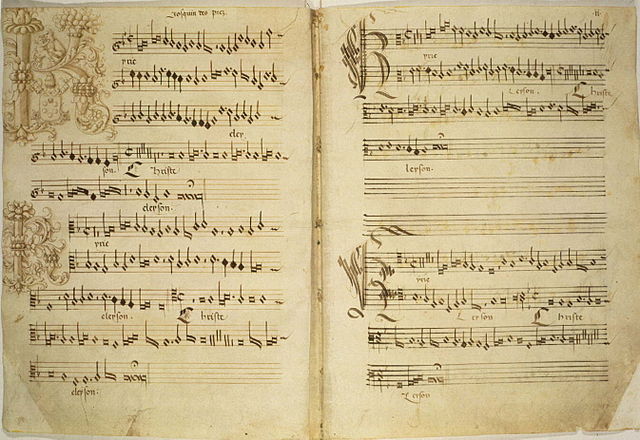Cipriano de Rore was a Franco-Flemish composer of the Renaissance, active in Italy. Not only a central representative of the generation of Franco-Flemish composers after Josquin des Prez who went to live and work in Italy, Rore was one of the most prominent composers of madrigals in the middle of the 16th century. His experimental, chromatic, and highly expressive style had a decisive influence on the subsequent development of that secular music form.
Detail of a miniature of Cipriano de Rore by Hans Müelich, probably 1558 or 1559
Josquin Lebloitte dit des Prez was a composer of High Renaissance music, who is variously described as French or Franco-Flemish. Considered one of the greatest composers of the Renaissance, he was a central figure of the Franco-Flemish School and had a profound influence on the music of 16th-century Europe. Building on the work of his predecessors Guillaume Du Fay and Johannes Ockeghem, he developed a complex style of expressive—and often imitative—movement between independent voices (polyphony) which informs much of his work. He further emphasized the relationship between text and music, and departed from the early Renaissance tendency towards lengthy melismatic lines on a single syllable, preferring to use shorter, repeated motifs between voices. Josquin was a singer, and his compositions are mainly vocal. They include masses, motets and secular chansons.

A 1611 woodcut of Josquin des Prez, possibly copied from a now-lost oil painting made during his lifetime. There have been doubts concerning whether this depiction is an accurate likeness, see § Portraits.
Josquin probably served under Louis XII, who had captured the Sforzas, his previous employers.
Ercole I d'Este, an important patron of the arts, was Josquin's employer during 1503–1504.
Manuscript showing the opening Kyrie of the Missa de Beata Virgine, a late work. Rome, Biblioteca Apostolica Vaticana, Capp. Sist. 45, ff. 1v-2r.





